A list of famous people throughout history. These famous historical figures are chosen from a range of different cultures and countries. They include famous spiritual figures, politicians and writers who have helped to shape human history.
BCE
 Sri Ramachandra (c. 5114 BCE) Rama was a model king of Ayodhya who lived according to the dharma. He went to Sri Lanka to fight Ravana who had captured his wife, Sita. Rama is considered an incarnation of Vishnu in Hindu mythology.
Sri Ramachandra (c. 5114 BCE) Rama was a model king of Ayodhya who lived according to the dharma. He went to Sri Lanka to fight Ravana who had captured his wife, Sita. Rama is considered an incarnation of Vishnu in Hindu mythology.
 Sri Krishna (c. BCE) – Spiritual Teacher of Hinduism. Sri Krishna gave many discourses to his disciple Arjuna on the battlefield of Kurukshetra. These discourses were written down in the Bhagavad Gita.
Sri Krishna (c. BCE) – Spiritual Teacher of Hinduism. Sri Krishna gave many discourses to his disciple Arjuna on the battlefield of Kurukshetra. These discourses were written down in the Bhagavad Gita.

 Homer (8th Century BC) Homer is the author of the Iliad and the Odyssey. Two classics of Greek literature. His writings form a significant influence on Western literature.
Homer (8th Century BC) Homer is the author of the Iliad and the Odyssey. Two classics of Greek literature. His writings form a significant influence on Western literature.

Lord Buddha 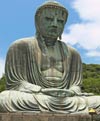 (c 563 – 483 BC) Spiritual Teacher and founder of Buddhism. Siddhartha was born a prince in northern India. He gave up the comforts of the palace to seek enlightenment. After attaining Nirvana, he spent the remainder of his years teaching.
(c 563 – 483 BC) Spiritual Teacher and founder of Buddhism. Siddhartha was born a prince in northern India. He gave up the comforts of the palace to seek enlightenment. After attaining Nirvana, he spent the remainder of his years teaching.
Confucius (551 – 479 BC) – Chinese politician, statesman, teacher and philosopher. His writings on justice, life and society became the prevailing teachings of the Chinese state and developed into Confucianism.
(551 – 479 BC) – Chinese politician, statesman, teacher and philosopher. His writings on justice, life and society became the prevailing teachings of the Chinese state and developed into Confucianism.
Socrates (469 BC–399 BC) – Greek philosopher. Socrates developed the ‘Socratic’ method of self-enquiry. He had a significant influence on his disciples, such as Plato and contributed to the development of Western philosophy and political thought.
(469 BC–399 BC) – Greek philosopher. Socrates developed the ‘Socratic’ method of self-enquiry. He had a significant influence on his disciples, such as Plato and contributed to the development of Western philosophy and political thought.
Plato (424 – 348 BC) – Greek philosopher. A student of Socrates, Plato founded the Academy in Athens – one of the earliest seats of learning. His writings, such as ‘The Republic’ form a basis of early Western philosophy. He also wrote on religion, politics and mathematics.
(424 – 348 BC) – Greek philosopher. A student of Socrates, Plato founded the Academy in Athens – one of the earliest seats of learning. His writings, such as ‘The Republic’ form a basis of early Western philosophy. He also wrote on religion, politics and mathematics.
Aristotle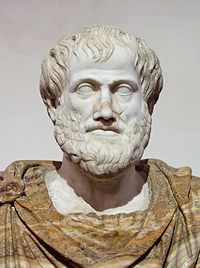 (384 BC – 322 BC) – Greek philosopher and teacher of Alexander the Great. Aristotle was a student of Plato, but he branched out into empirical research into the physical sciences. His philosophy of metaphysics had an important influence on Western thought.
(384 BC – 322 BC) – Greek philosopher and teacher of Alexander the Great. Aristotle was a student of Plato, but he branched out into empirical research into the physical sciences. His philosophy of metaphysics had an important influence on Western thought.
Alexander the Great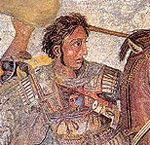 (356 – 323 BC) – King of Macedonia. He established an Empire stretching from Greece to the Himalayas. He was a supreme military commander and helped diffuse Greek culture throughout Asia and northern Africa.
(356 – 323 BC) – King of Macedonia. He established an Empire stretching from Greece to the Himalayas. He was a supreme military commander and helped diffuse Greek culture throughout Asia and northern Africa.
 Archimedes (287 B.C – 212) Mathematician, scientist and inventor. Archimedes made many contributions to mathematics. He explained many scientific principles, such as levers and invented several contraptions, such as the Archimedes screw.
Archimedes (287 B.C – 212) Mathematician, scientist and inventor. Archimedes made many contributions to mathematics. He explained many scientific principles, such as levers and invented several contraptions, such as the Archimedes screw.
Ashoka



AD
 Jesus of Nazareth (c.5BC – 30AD), Jesus of Nazareth, was a spiritual teacher, and the central figure of Christianity. By Christians, he is considered to be the Messiah predicted in the Old Testament.
Jesus of Nazareth (c.5BC – 30AD), Jesus of Nazareth, was a spiritual teacher, and the central figure of Christianity. By Christians, he is considered to be the Messiah predicted in the Old Testament.
St Paul
Marcus Aurelius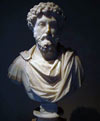 (121 – 180) – Roman Emperor and philosopher. He is considered the last of the five good Emperors. His Meditations are a classic account of Stoic philosophy.
(121 – 180) – Roman Emperor and philosopher. He is considered the last of the five good Emperors. His Meditations are a classic account of Stoic philosophy.
Emperor Constantine
Muhammad

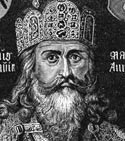 Charlemagne (742 – 814) – King of Franks and Emperor of the Romans. Charlemagne unified Western Europe for the first time since the fall of the Roman Empire. He provided protection for the Pope in Rome.
Charlemagne (742 – 814) – King of Franks and Emperor of the Romans. Charlemagne unified Western Europe for the first time since the fall of the Roman Empire. He provided protection for the Pope in Rome.
Genghis Kahn 

Saladin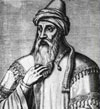 (1138 – 1193) – Leader of the Arabs during the Crusades. He unified Muslim provinces and provided effective military opposition to the Christian crusades.
(1138 – 1193) – Leader of the Arabs during the Crusades. He unified Muslim provinces and provided effective military opposition to the Christian crusades.
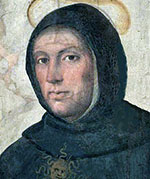 Thomas Aquinas (1225 – 1274) Influential Roman Catholic priest, philosopher and theologian.
Thomas Aquinas (1225 – 1274) Influential Roman Catholic priest, philosopher and theologian.
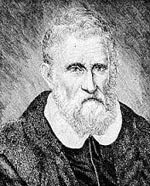 Marco Polo (1254 – 1324) Venetian traveller and explorer who made ground-breaking journeys to Asia and China, helping to open up the Far East to Europe.
Marco Polo (1254 – 1324) Venetian traveller and explorer who made ground-breaking journeys to Asia and China, helping to open up the Far East to Europe.
Johann Gutenberg
Joan of Arc – (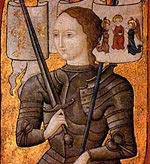 1412-1431) – French saint. Jean d’Arc was a young peasant girl who inspired the Dauphin of France to renew the fight against the English. She led French forces into battle.
1412-1431) – French saint. Jean d’Arc was a young peasant girl who inspired the Dauphin of France to renew the fight against the English. She led French forces into battle.
Christopher Columbus
Leonardo da Vinci (
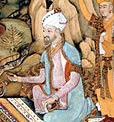 Guru Nanak (1469 1539) Indian spiritual teacher who founded the Sikh religion. Guru Nanak was the first of the 10 Sikh Gurus. He travelled widely disseminating a spiritual teaching of God in everyone.
Guru Nanak (1469 1539) Indian spiritual teacher who founded the Sikh religion. Guru Nanak was the first of the 10 Sikh Gurus. He travelled widely disseminating a spiritual teaching of God in everyone.
Martin Luther  (1483 – 1546) – A key figure in the Protestant Reformation. Martin Luther opposed papal indulgences and the power of the Pope, sparking off the Protestant Reformation.
(1483 – 1546) – A key figure in the Protestant Reformation. Martin Luther opposed papal indulgences and the power of the Pope, sparking off the Protestant Reformation.
Babur
William Tyndale
Akbar
Sir Walter Raleigh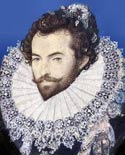 (1552 – 1618) – English explorer who made several journeys to the Americas, including a search for the lost ‘Eldorado.’
(1552 – 1618) – English explorer who made several journeys to the Americas, including a search for the lost ‘Eldorado.’
Galileo Galilei
William Shakespeare 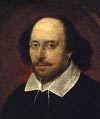 (1564- 1616) English poet and playwright. Shakespeare’s plays, such as Hamlet, Macbeth and Othello have strongly influenced English literature and Western civilisation.
(1564- 1616) English poet and playwright. Shakespeare’s plays, such as Hamlet, Macbeth and Othello have strongly influenced English literature and Western civilisation.
 Rene Descartes (1596 – 1650) Dubbed the father of modern philosophy, Descartes was influential in a new rationalist movement, which sought to question basic presumptions with reason.
Rene Descartes (1596 – 1650) Dubbed the father of modern philosophy, Descartes was influential in a new rationalist movement, which sought to question basic presumptions with reason.
Oliver Cromwell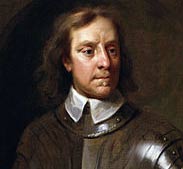 (1599 – 1658) – British Parliamentarian. Cromwell led his new model army in defeating King Charles I and creating a new model of government.
(1599 – 1658) – British Parliamentarian. Cromwell led his new model army in defeating King Charles I and creating a new model of government.
Voltaire
Sir Isaac Newton 
Eighteenth Century
Catherine the Great


Tho mas Jefferson (1743- 1826) 3rd President of US. Author of the Declaration of Independence. Jefferson passed laws on religious tolerance in his state of Virginia and founded the University of Virginia.
mas Jefferson (1743- 1826) 3rd President of US. Author of the Declaration of Independence. Jefferson passed laws on religious tolerance in his state of Virginia and founded the University of Virginia.
Mozart (1756 – 1791) – Austrian Music composer. Mozart’s compositions ranged from waltzes to Requiem. He is widely regarded as one of the greatest musical geniuses of all time.
(1756 – 1791) – Austrian Music composer. Mozart’s compositions ranged from waltzes to Requiem. He is widely regarded as one of the greatest musical geniuses of all time.
Nineteenth Century
William Wilberforce  (1759 – 1833) – British MP and campaigner against slavery. Wilberforce was a key figure in influencing British public opinion and helping to abolish slavery in 1833.
(1759 – 1833) – British MP and campaigner against slavery. Wilberforce was a key figure in influencing British public opinion and helping to abolish slavery in 1833.
Napoleon Bonaparte (1769 – 1821) – French military and political leader. Napoleon made France a major European power and meant his Napoleonic code was widely disseminated across Europe.
(1769 – 1821) – French military and political leader. Napoleon made France a major European power and meant his Napoleonic code was widely disseminated across Europe.
Simon Bolivar 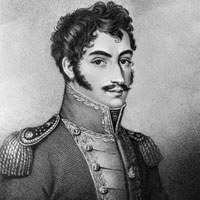 (1783 – 1830) – Liberator of Latin American countries. Bolivar was responsible for the liberation of Peru, Bolivia, Venezuela and Colombia.
(1783 – 1830) – Liberator of Latin American countries. Bolivar was responsible for the liberation of Peru, Bolivia, Venezuela and Colombia.
Abraham Lincoln 
Charles Darwin
Karl Marx
Queen Victoria 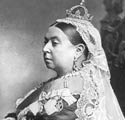 (1819 – 1901) – Queen of Great Britain during the Nineteenth Century. She oversaw the industrial revolution and the growth of the British Empire.
(1819 – 1901) – Queen of Great Britain during the Nineteenth Century. She oversaw the industrial revolution and the growth of the British Empire.
Louis Pasteur
Leo Tolstoy 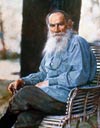 (1828 – 1910) – Russian writer and philosopher. Tolstoy wrote the epic ‘War and Peace’ Tolstoy was also a social activist – advocating non-violence and greater equality in society.
(1828 – 1910) – Russian writer and philosopher. Tolstoy wrote the epic ‘War and Peace’ Tolstoy was also a social activist – advocating non-violence and greater equality in society.
Thomas Edison 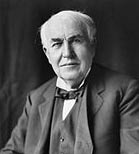 (1847 – 1931) – Inventor and businessman. Edison developed the electric light bulb and formed a company to make electricity available to ordinary homes.
(1847 – 1931) – Inventor and businessman. Edison developed the electric light bulb and formed a company to make electricity available to ordinary homes.
Twentieth Century
Oscar Wilde 
Woodrow Wilson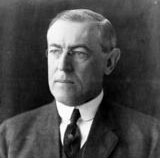 (1856 – 1924) – President of US during WWI. Towards the end of the war, Wilson developed his 14 points for a fair peace, which included forming a League of Nations.
(1856 – 1924) – President of US during WWI. Towards the end of the war, Wilson developed his 14 points for a fair peace, which included forming a League of Nations.
Mahatma Gandhi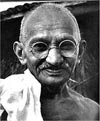 (1869 – 1948) – Indian nationalist and politician. Gandhi believed in non-violent resistance to British rule. He sought to help the ‘untouchable’ caste and also reconcile Hindu and Muslims.
(1869 – 1948) – Indian nationalist and politician. Gandhi believed in non-violent resistance to British rule. He sought to help the ‘untouchable’ caste and also reconcile Hindu and Muslims.
 V. Lenin (1870-1924) – Born in Ulyanovsk, Russia. Lenin was the leader of Bolsheviks during the Russian Revolution in 1917. Lenin became the first leader of the Soviet Union influencing the direction of the new Communist state.
V. Lenin (1870-1924) – Born in Ulyanovsk, Russia. Lenin was the leader of Bolsheviks during the Russian Revolution in 1917. Lenin became the first leader of the Soviet Union influencing the direction of the new Communist state.

Winston Churchill  (1874 – 1965) Prime Minister of Great Britain during the Second World War. Churchill played a key role in strengthening British resolve in the dark days of 1940.
(1874 – 1965) Prime Minister of Great Britain during the Second World War. Churchill played a key role in strengthening British resolve in the dark days of 1940.
Konrad Adenauer
Albert Einstein
Ataturk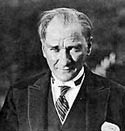 (1881-1938) – founder of the Turkish Republic. From the ruins of the Ottoman Empire, Ataturk forged a modern secular Turkish republic.
(1881-1938) – founder of the Turkish Republic. From the ruins of the Ottoman Empire, Ataturk forged a modern secular Turkish republic.
A Little History of the World: Illustrated Edition at Amazon – by E. H. Gombrich
John M Keynes
Franklin D. Roosevelt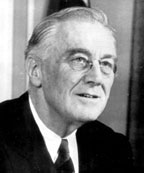 (1882 – 1945) US President (1932-1945) Roosevelt led the US through its most turbulent time of the great depression and World War II.
(1882 – 1945) US President (1932-1945) Roosevelt led the US through its most turbulent time of the great depression and World War II.
Adolf Hitler  (1889 – 1945) Dictator of Nazi Germany. Hitler sought to conquer Europe and Russia, starting World War Two. Also responsible for the Holocaust, in which Jews and other ‘non-Aryans’ were killed.
(1889 – 1945) Dictator of Nazi Germany. Hitler sought to conquer Europe and Russia, starting World War Two. Also responsible for the Holocaust, in which Jews and other ‘non-Aryans’ were killed.
Jawaharlal Nehru  (1889-1964) – First Indian Prime Minister. Nehru came to power in 1947 and ruled until his death in 1964. He forged a modern democratic India, not aligned to either US or the Soviet Union.
(1889-1964) – First Indian Prime Minister. Nehru came to power in 1947 and ruled until his death in 1964. He forged a modern democratic India, not aligned to either US or the Soviet Union.
Dwight Eisenhower
Charles de Gaulle  (1890- 1970) French politician. De Gaulle became leader of the ‘Free French’ after the fall of France in 1940. Became President after the war, writing the constitution of the 5th Republic.
(1890- 1970) French politician. De Gaulle became leader of the ‘Free French’ after the fall of France in 1940. Became President after the war, writing the constitution of the 5th Republic.

Mother Teresa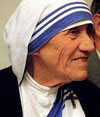 (1910-1997) – Catholic nun from Albania who went to India to serve the poor. Became a symbol of charity and humanitarian sacrifice. Awarded the Nobel Peace Prize.
(1910-1997) – Catholic nun from Albania who went to India to serve the poor. Became a symbol of charity and humanitarian sacrifice. Awarded the Nobel Peace Prize.
John F. Kennedy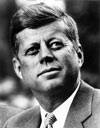 (1917 – 1963) – US President 1961-1963. J. F.Kennedy helped to avert nuclear war during the Cuban missile crisis. He also began to support the civil rights movement before his assassination in Dallas, November 1963.
(1917 – 1963) – US President 1961-1963. J. F.Kennedy helped to avert nuclear war during the Cuban missile crisis. He also began to support the civil rights movement before his assassination in Dallas, November 1963.
Nelson Mandela 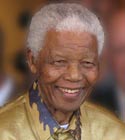 (1918 – ) The first President of democratic South Africa in 1994. Mandela was imprisoned by the apartheid regime for 27 years, but on his release helped to heal the wounds of apartheid through forgiveness and reconciliation.
(1918 – ) The first President of democratic South Africa in 1994. Mandela was imprisoned by the apartheid regime for 27 years, but on his release helped to heal the wounds of apartheid through forgiveness and reconciliation.
Pope John Paul II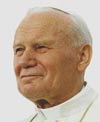 (1920 – 2005) – Polish Pope from 1978-2005. Pope John Paul is credited with bringing together different religions and playing a role at the end of Communism in Eastern Europe.
(1920 – 2005) – Polish Pope from 1978-2005. Pope John Paul is credited with bringing together different religions and playing a role at the end of Communism in Eastern Europe.
Queen Elizabeth 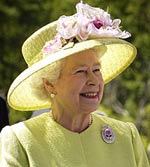 II (1926 – ) British Queen from 1952. The second longest serving monarch in history, Elizabeth saw six decades of social and political change.
II (1926 – ) British Queen from 1952. The second longest serving monarch in history, Elizabeth saw six decades of social and political change.
Martin Luther King 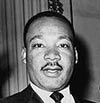 (1929 – 1968) Martin Luther King was a powerful leader of the non-violent civil rights movement. His 1963 speech ‘I have a dream’ being a pinnacle moment.
(1929 – 1968) Martin Luther King was a powerful leader of the non-violent civil rights movement. His 1963 speech ‘I have a dream’ being a pinnacle moment.
14th Dalai Lama (1938 – ) Spiritual and political leader of Tibetans. The Dalai Lama was forced into exile by the invading Chinese. He is a leading figure for non-violence and spirituality.
(1938 – ) Spiritual and political leader of Tibetans. The Dalai Lama was forced into exile by the invading Chinese. He is a leading figure for non-violence and spirituality.
Mikhail Gorbachev  (1931 – ) Leader of the Soviet Union. Oversaw transition from Communism in Eastern Europe to democracy. Awarded the Nobel Peace Prize in 1990.
(1931 – ) Leader of the Soviet Union. Oversaw transition from Communism in Eastern Europe to democracy. Awarded the Nobel Peace Prize in 1990.
Muhammad Ali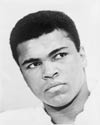 (1942- ) American boxer. Muhammad Ali had his boxing license removed for refusal to fight in Vietnam. He became a leading figure in the civil rights movement.
(1942- ) American boxer. Muhammad Ali had his boxing license removed for refusal to fight in Vietnam. He became a leading figure in the civil rights movement.
Citation: Pettinger, Tejvan. “Famous historical people”, Oxford, UK. biographyonline.net, 18/12/2013. Published 1 March 2018. Last updated 7 July 2019
1000 Years of Famous People
1000 Years of Famous People at Amazon
Related Pages



Related pages


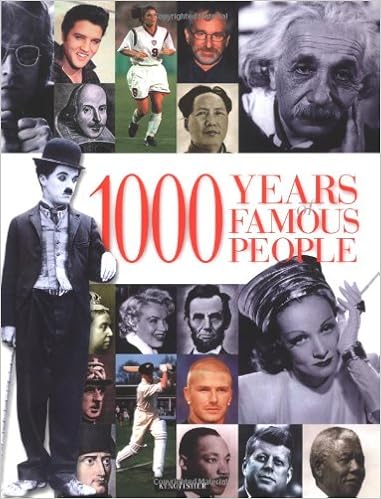
11 Comments
Why they not inculede quid e Azam Muhamad Ali Jinnah and Allma iqbal
This is going to help me with my social studies project.?
I love the site, thank you!
your forget to mention one biggest personality name which is known as
‘symbol of knowledge’
Where’s the name of the politician who opened up Communist China…Richard M. Nixon?
History is so much fun I love history
where is Ashoka the great;
Thomas Edison is linked to King Arthur.
Otherwise a really nice website ;)
I would like to request the respected admins to include the biography of Quaid-i-Azam Muhammad Ali Jinnah , the founder of Islamic Republic of Pakistan. One of the most talented Politician and a great think head of twentieth Century
thank you
Thank you. I have corrected photo of Babur
ok the answer is ‘because they are super dopo crazy”